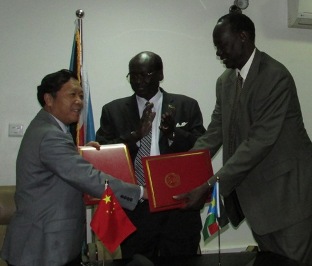South Sudan downplays Netherlands aid cut
September 5, 2014 (JUBA) – South Sudan has downplayed a decision by Netherlands to cut direct financial assistance, describing the move as unfair given the government’s commitment to peace talks with armed rebels led by former vice-president Riek Machar.

“Every country is free to give you or not to give. We can’t take them (the Netherlands) to court,” said Marial.
The Dutch minister for foreign trade and development cooperation, Lillianne Plouman, announced on Thursday that the Netherlands was suspending aid supporting the training of police, army officers and diplomats, citing South Sudan’s poor human rights record in the country, as well as a lack of commitment by its leaders to end the more than eight-month-long conflict peacefully.
Marial said his government was taking part in peace negotiations in good faith, claiming the rebel faction led by former vice-president was stalling progress.
“You have seen [the] re-dedication on the implementation of the cessation of hostilities [agreement]. Our president signed with the other presidents of IGAD countries. What more commitment do you need from the government?” said Marial when questioned by reporters about his government’s commitment to peace talks.
“I think if there is anything that [the] Netherlands should do is to put pressure on the rebels so that they come back to the table so that we can enhance peace within 45 days,” he added, referring to a new ultimatum issued last month by mediators from the Intergovernmental Authority on Development (IGAD).
CHINA CONTRIBUTES $25 MILLION
Meanwhile, the Chinese ambassador to South Sudan, Ma Qiang, announced a grant of $25 million in humanitarian aid to be managed by the South Sudanese government.
Qiang said the donation is part of long-term economic and technical cooperation between both countries.
“We hope the relevant parties could put the national and people’s interests first, cherish peace and stability, so as to resolve their dispute peacefully through negotiations,” said Qiang, while exchanging signed copies of the agreement with Charles Manyang, the undersecretary for the ministry of foreign affairs.
China is a major player in South Sudan’s oil exploration industry, the main source of revenue for the world’s youngest country.
Qiang said if South Sudan’s rival leaders agree on a transitional government of national unity, Chinese aid will flow.
“South Sudan is rich in natural resources and the people here are intelligent. The development potential is huge,” Qiang said.
“I believe, under the leadership of the government and the help of the Chinese government, the sustainable economic development will be made, the living standard of the people will improve and your esteemed country will be prosperous very soon,” he added.
Marial has applauded the Chinese government’s contribution, describing it as a good gesture.
“This is a genuine cooperation and we thank them (the Chinese) on behalf of the people of South Sudan who are supposed to benefit from all these technical cooperation agreement,” Marial said.
The $25 million contribution will support agricultural projects and assist part of humanitarian disaster relief, Marial said.
“We have got this food insecurity. And food insecurity in a country is a very bad sign. It hinders development,” he said.
(ST)
